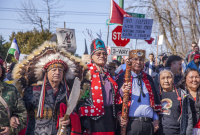Support strong Canadian climate journalism for 2025
The conflict around the construction of Kinder Morgan’s proposed Trans Mountain pipeline expansion is much more than a spat between two provincial governments. It cannot be reduced to a battle of jurisdiction between Ottawa and Victoria either. Witnessing this struggle from Québec, we are reminded of the acrimonious debates that surrounded TransCanada’s proposed Energy East pipeline.
We stood against Energy East from the start and today, we stand with those who are opposing the Trans Mountain pipeline. Our opposition to Energy East was grounded in the firm conviction that building up pipeline capacity is bad for the planet, and ultimately bad for Canada. Expanding transport capacity translates into expanded extraction, further locking in Canada’s dependence on the long-term development of the oil sands sector when we should in fact be planning the phasing out of this carbon intensive industry. We are convinced that each extra barrel exported moves us further from our already inadequate greenhouse gas reduction targets. In addition, we believe that the risks of a major oil spill are too high a price to pay for hydrocarbons that should be left in the ground.
Our opposition to Energy East was further strengthened by the fact that peoples from the First Nations in Québec were also firmly opposed to the pipeline project and made this opposition an issue of sovereignty. In coming together as allies against Energy East, we defended our shared territory and confronted the colonialism that too often marred the history of our relationship. And in voicing their opposition, both First Nations and Québécois faced a barrage of racist attacks that reminded us of some of the darkest days of this country. Today the First Nations and people of British Columbia are facing the same intolerance for dissent.
Thankfully, the struggle against Energy East ended much faster than we anticipated and an escalating conflict between TransCanada and civil society was avoided. Over 42,000 people had signed the Élan Global manifesto against Energy East, hundreds of citizens’ committees had been formed in almost all communities on or near the pipeline’s planned trajectory and rallied the Coule pas Chez Nous coalition. First Nations across North America stood behind front line communities such as the Mohawks of Kanesatake in the Treaty Alliance Against Tar Sands Expansion. Opposition was firm, strong and organized, support was broad and reached across Québec’s usual political fault lines, bringing together federalists and sovereigntists, people from the left, right and center, First Nations and Quebecers of all origins.
Today, we see the same broad alliance of movements mobilized among the peoples that live on the Salish Sea coast. We see the motivation and determination and we recognize that the reasons to oppose Transmountain are substantially the same as those that inspired our struggle against Energy East. Politics and economics have moved the struggle West, but it remains our struggle.
We stand with you, citizens and governments of British Colombia, First Nations of the coast and the interior. You are not struggling against the people of Alberta, you are not acting against Canada’s “national interest,” you are not seeking to damage or harm the economy. You are trying to fight climate change and to open a new era of low-carbon economic development. You are holding Ottawa to account on its obligations and undertakings stemming from the Paris climate agreement, and you are trying to protect the natural waters that surround you and the ecosystems they harbor. You are defending the dignity and sovereignty of First Nations all over this country.
Though we have seen a change of government in Ottawa, it seems that the priorities of the oil industry still exert undue influence and trump our attempts to transition away from a carbon dependent economy and way of life.
That’s why for us in Québec, your struggle is our struggle.
Mr. Trudeau, oil and water don’t mix. Scientific study after scientific study has shown that expanding the oil sands is incompatible with realizing the objectives stated in the 2015 Paris climate agreement and you know it. Pretending otherwise amounts to climate denialism. For too long, you and your ministers have entertained this fantasy and are now using the screen of “national interest” to cloud the real terms of the debate.
Though Burnaby is on the other side of the country, we fully understand the implications for us here in Québec of the resistance against the Trans Mountain pipeline project. By supporting this company in its efforts to impose on unwilling communities a major pipeline, you are undermining our efforts here in Québec and elsewhere in Canada to limit climate change and transition to a low carbon economy. By invoking “national interest” against a determined civil society and against First Nations, you are thwarting the democratic principles and practice of reconciliation that you publicly affirm.
Know that an attack on the democratic rights of citizens and the sovereignty of First Nations anywhere in Canada is on attack on all, be they in Québec or in B.C.. We stand by them in this historical moment when we make decisions that will engage this country and the world for generations ahead. We were ready for Energy East, now our energies will be directed to supporting those struggling for the climate and against Kinder Morgan’s pipeline.
Letter by:
Élan Global collective
Camil Bouchard, associate professor, department of psychology UQAM, former MP for the Parti Québécois;
Jérôme Durpas, professor, department of Natural Sciences, UQO and musician, Cowboys Fringants;
Karel Mayrand, David Suzuki Foundation and author;
Eric Pineault, Professor, department of Sociology and Environmental Sciences Institute, UQAM;
Annie Roy, artist, ATSA;
Laure Waridel, Associate professor Center for Interdisciplinary Research on Wellbeing, Health, Society and the Environment (CINBIOSIS), UQAM.
Signed by:
Chloé Sainte-Marie, singer and actress
Françoise David, former MP for Québec solidaire at the National Assembly of Québec
Sara Teitelbaum, Assistant Professor, Director of Environmental Programs and Sustainable Development at the Université de Montréal
Josée Blanchette, columnist Le Devoir
Armand Vaillancourt, sculpter and painter
Richard Séguin, songwriter and singer
François Delorme, economist
Bruce Johnston, lawyer at Trudel Johnston & Lespérance
Claude Béland, Advocatus Emeritus (Quebec), Chairman of the Board of the Institute and Economis Progress in a Quebec University
He was active in the Cooperative Movement and Chairman of de Desjardins group from 1987-2000.
- André-Pierre Contandriopoulos, Professor Emeritus, Department of Management, Evaluation and Health Policy, School of Public Health, University of Montreal
- Léa Clermont-Dion, Author and blogger
Fred Pellerin, storyteller, songwriter, singer
Mark Fortier, publisher, Lux editions
Peter Brown, professor, McGill
Anne-Céline Guyon, former president, Coule Pas Chez Nous





Comments
These are all good words; however, no one has the courage to offer an alternative plan to accomplish the move away from fossil fuels.
Where do these people thing the current oil is coming from for refining into products such as gasoline, lubricating oil, heating fuel - it is coming from off shore and the United States - no concrete action at the United Nations or the governments world wide to collectively present a workable alternative plan to move away from our dependence on fossil fuels
Talk, Talk, Talk is all that takes place - no concrete definable plans with penalties for non-compliance, without them the goal is extremely tough to achieve.
The average human being world wide wants what they have, until that attitude is changed at all levels in our society - "NO SUCCESS WILL BE ACHIEVED"
Mr. Atkinson,
First, there's so much information/proof floating around for all to access attesting to the myriad of energy alternatives, that all you have to do is get your head out of the sand to see them!
Next, as far as what is necessary to enact and enforce said alternatives, you are correct: THERE IS NO POLITICAL WILL for this! It is more than obvious that the politicians involved in forcing through this unwanted pipeline are taking orders from the corporations in the oilpatch - i.e. business as usual. That is why people who truly CARE about the future of where they live, etc., are actively involved, as all Canadians should be!
Finally, yes you are correct in stating that the vast majority of comfortable humans are uninformed, lazy bums who HATE change! You must at least be congratulated for accessing such excellent alternative journalism as found in National Observer - a feat most don't even bother with! However, you could do yourself a favour and further enhance your information supply with an examination of such sources as the Leap Manifesto, based on the last two books by Naomi Klein. Do not fear - you don't have to swallow every word, just be open to a different paradigm shift in thinking, to see the big picture of radical change required to save our home on earth!
Thank you.
How many First Nations are claiming to be affected by this proposed project?
http://aptnnews.ca/2018/04/13/alberta-pipeline-draft/
"Kinder Morgan says 51 First Nations have agreed to pipeline expansion project"
https://canadians.org/kinder-morgan
"Over 61 First Nations have spoken out against the project."
https://www.nationalobserver.com/2018/01/22/news/paternalistic-first-na…
"The Trudeau government approved the Kinder Morgan oil pipeline expansion project after being told in a series of memos that First Nations believed its "paternalistic" approach to consultations was both "unrealistic" and "inadequate," reveal newly-released records obtained by National Observer.", and
"Carr's department told National Observer that these consultations were part of an "ongoing process" while confirming that it received negative feedback "during extensive Indigenous consultations.", and
"Carr was also told that 59 of the 114 Indigenous groups affected by the pipeline needed more time for adequate consultations, while 32 groups supported the project through a mutual benefit agreement. An additional 23 groups had little or no interaction with the government despite "engagement efforts" and there wasn't any indication what their position was, said the Nov. 10 memo to Carr. "
http://aptnnews.ca/2018/04/13/the-first-nation-that-believes-it-can-sto…
"His [Chief Lee Spahan] community [Coldwater] has turned down a possible deal worth millions in the fight, while Kinder Morgan says 43 deals have been signed with First Nations and Indigenous groups.", and,
Mohawk policy analyst Russ Diabo, who's running to lead the Assembly of First Nations, states, "“I would argue the Aboriginal title holders need to be involved in agreements like that where a pipeline spill of that bitumen could affect all the Indigenous harvesters,” he said. “They should have a say in any kind of agreements with oil and gas companies on projects that affect their rights. Shouldn’t be chief and council deciding through a band council resolution.”
How many chief and council decisions have made deals with Kinder Morgan, without full band member participation in those decisions?
Let Canadians see the final numbers of First Nations bands that oppose vs. support this project, and document, for the record, how many bands had the direct participatory support of their band membership in the decision-making process through something other than a chief/council resolution?